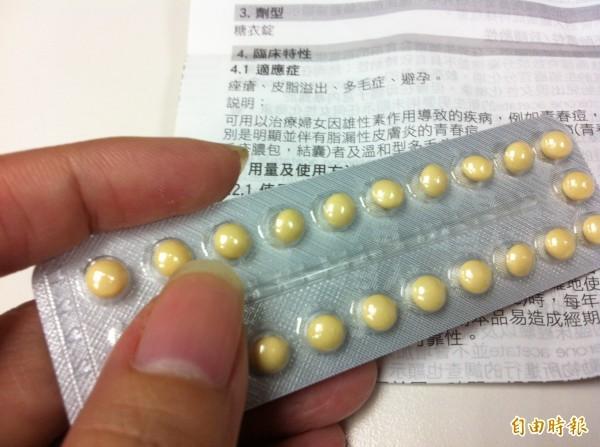Emergency contraceptive pills would continue to require a doctor's prescription for the time being, the Food and Drug Administration (FDA) said on Thursday, after a multi-stakeholder meeting the same day failed to reach a consensus over whether to reclassify the drug as over-the-counter medication.
The FDA invited representatives from the Ministry of Education, the Department of Gender Equality, civil society groups, the pharmaceutical industry and other groups to discuss the potential relaxation of rules governing the so-called "morning-after pill."
However, opinions were divided as to whether to reclassify emergency contraception to enable it to be available for purchase at pharmacies without a doctor's prescription — which is currently required.

Photo: Hung Su-ching, Taipei Times
Speaking in support of deregulation, pharmacist Li Yi-hsuan (李懿軒) from the Federation of Taiwan Pharmacists Associations said that the WHO recommends making emergency contraception available as a backup when regular contraception fails.
"Eighty percent of developed countries" — including the US, the UK and Australia — have already reclassified emergency contraceptive pills as over-the-counter medication, Li said.
The Taipei Women's Rescue Foundation said that "emergency contraceptive pills are not high-risk medication" and greater availability would "protect women from the risk of forced or unexpected pregnancy, and safeguard their bodily and reproductive autonomy."
Speaking in opposition to the proposal, Taiwan Association of Obstetrics and Gynecology secretary-general Huang Jian-pei (黃建霈) said that emergency contraceptive medicine could "lead to problems if used without understanding the risks."
Huang, who is director of the Department of Obstetrics and Gynecology at MacKay Memorial Hospital, cited an example of a woman who mistook abnormal vaginal bleeding as her menstrual period.
She died from a ruptured ectopic pregnancy after taking emergency contraception because she "had not taken the bleeding seriously," he said.
FDA Deputy Director-General Wang Der-yuan (王德原) said after the meeting that the discussion involved social science, natural science and human rights considerations, and that "there is no zero-risk decision."
The issue of whether to reclassify emergency contraception had been raised as early as 2016 by the FDA, but the proposal was shelved due to a social backlash at the time.
On Tuesday, Taiwan People's Party Legislator Lin Yi-chun (林憶君) called for emergency contraceptives to be changed from prescription drugs to over-the-counter medication.
"An online survey in 2024 found that 65 percent of [respondent] women supported making it available," Lin said at the legislature in Taipei.
Premier Cho Jung-tai (卓榮泰) said that he had already asked Minister of Health and Welfare Chiu Tai-yuan (邱泰源) to coordinate with the medical community to reach a consensus as soon as possible on the issue.

A preclearance service to facilitate entry for people traveling to select airports in Japan would be available from Thursday next week to Feb. 25 at Taiwan Taoyuan International Airport, Taoyuan International Airport Corp (TIAC) said on Tuesday. The service was first made available to Taiwanese travelers throughout the winter vacation of 2024 and during the Lunar New Year holiday. In addition to flights to the Japanese cities of Hakodate, Asahikawa, Akita, Sendai, Niigata, Okayama, Takamatsu, Kumamoto and Kagoshima, the service would be available to travelers to Kobe and Oita. The service can be accessed by passengers of 15 flight routes operated by

Alain Robert, known as the "French Spider-Man," praised Alex Honnold as exceptionally well-prepared after the US climber completed a free solo ascent of Taipei 101 yesterday. Robert said Honnold's ascent of the 508m-tall skyscraper in just more than one-and-a-half hours without using safety ropes or equipment was a remarkable achievement. "This is my life," he said in an interview conducted in French, adding that he liked the feeling of being "on the edge of danger." The 63-year-old Frenchman climbed Taipei 101 using ropes in December 2004, taking about four hours to reach the top. On a one-to-10 scale of difficulty, Robert said Taipei 101

Taiwanese and US defense groups are collaborating to introduce deployable, semi-autonomous manufacturing systems for drones and components in a boost to the nation’s supply chain resilience. Taiwan’s G-Tech Optroelectronics Corp subsidiary GTOC and the US’ Aerkomm Inc on Friday announced an agreement with fellow US-based Firestorm Lab to adopt the latter’s xCell, a technology featuring 3D printers fitted in 6.1m container units. The systems enable aerial platforms and parts to be produced in high volumes from dispersed nodes capable of rapid redeployment, to minimize the risk of enemy strikes and to meet field requirements, they said. Firestorm chief technology officer Ian Muceus said

MORE FALL: An investigation into one of Xi’s key cronies, part of a broader ‘anti-corruption’ drive, indicates that he might have a deep distrust in the military, an expert said China’s latest military purge underscores systemic risks in its shift from collective leadership to sole rule under Chinese President Xi Jinping (習近平), and could disrupt its chain of command and military capabilities, a national security official said yesterday. If decisionmaking within the Chinese Communist Party has become “irrational” under one-man rule, the Taiwan Strait and the regional situation must be approached with extreme caution, given unforeseen risks, they added. The anonymous official made the remarks as China’s Central Military Commission Vice Chairman Zhang Youxia (張又俠) and Joint Staff Department Chief of Staff Liu Zhenli (劉振立) were reportedly being investigated for suspected “serious